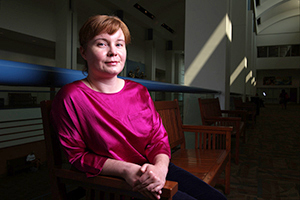October 27, 2015
Faculty Profile: Izabela Szymanska, assistant professor of management College of Business & Management
 Born in 1980 in Poland, Izabela Szymanska witnessed the birth of the country’s Solidarity movement, and though young during its flourishing decade, was awestruck by its impact. She saw this movement transform her country’s peoples as it empowered them to take responsibility for their lives. Notable were economic changes, as citizens went from being government-supported to owning businesses.
Born in 1980 in Poland, Izabela Szymanska witnessed the birth of the country’s Solidarity movement, and though young during its flourishing decade, was awestruck by its impact. She saw this movement transform her country’s peoples as it empowered them to take responsibility for their lives. Notable were economic changes, as citizens went from being government-supported to owning businesses.
Family business and entrepreneurship were fledgling opportunities that motivated a young Szymanska to dream that one day she would study business and entrepreneurship in the U.S. because, as she asks, “Who does it better?”
So it is no wonder that the assistant professor of management chose a case study of family business and innovative changes for her recently-defended doctoral dissertation.
And it’s equally no wonder that Szymanska felt that when she arrived at SVSU in fall 2014, she had found a “perfect fit.” That’s because she is teaching entrepreneurship classes as well as working with the Dow Entrepreneurship Institute at SVSU, the Stevens Center for Family Business, and SVSU students.
She is quick to point out that SVSU’s focus on family business was not only very attractive to her, but that such a program affiliated with a university is not very common. That, she says, is great for both students and the region.
It is in the role of teacher that Szymanska makes her greatest impact. “I work with students on independent studies, take them to business events, and bring speakers into the classroom, all to enrich the student experience. “
And in the very brief time she has been at the university, she has led a student team to the University of Vermont’s Family Enterprise Case Competitions held each winter. She is already planning a return trip in 2015-16, noting the value of this competitive experiential learning for her academic college’s students.
Szymanska especially enjoys teaching Introduction to Entrepreneurship, a semester-long course where students create a comprehensive business plan. “Some love it and some learn that entrepreneurship is not for them. That’s not a bad thing; rather it’s invaluable for students to participate in that discovery process,” Szymanska said.
And some students are excited about becoming an “intrapreneur,” an employee within a company charged with bringing new products or innovations to market. “This can be very appealing to students who don’t necessarily want to start a business, yet who want to bring that entrepreneurial energy to a company.”
Szymanska’s enthusiasm and efforts must be paying off, as an influx of student interest in entrepreneurship has led to adding another section of the course this academic year.
